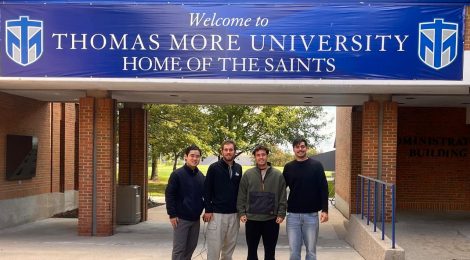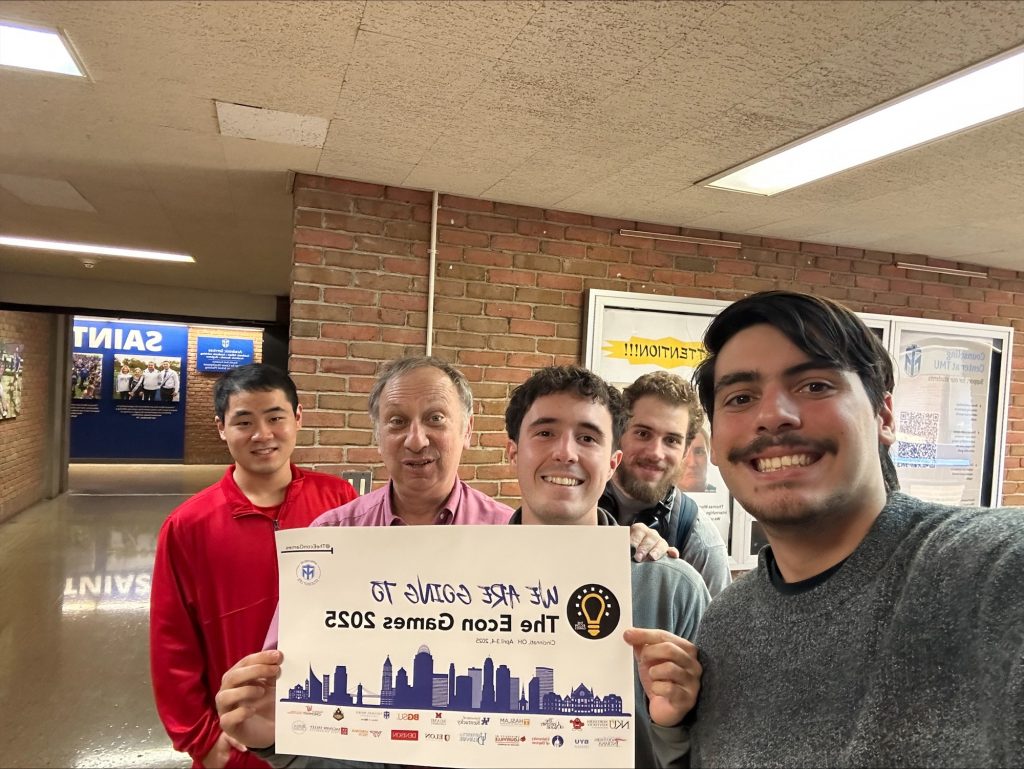
Saints Spotlight: Ezequiel Villarreal
In this edition of Saints Spotlight, host Kendra Yurt caught up with Thomas More econ major Ezequiel Villarreal. Ezequiel is co-captain for the team from Thomas More that will compete in the 2025 Econ Games.
What was your path to attending Thomas More?
Ezequiel: My path attending Thomas More was because of soccer. I was a student in a West Virginia school, Concord University. I was there for a year and a half, and I transferred here because of soccer. I know a coach came from there. Basically, I transferred here because of soccer.
Have you always been passionate about economics?
Ezequiel: Well, yeah, I come from a country where economics is a big deal– politics and economics.
At my previous school, I wasn’t an econ major because it wasn’t offered, but when I saw all the courses offered here and majors and I saw economics, I knew that I was going to change to economics right when I got here and thankfully, my first day, I met Professor Robinson, and he helped me; transferring classes, and which classes I had to enroll. It was pretty cool.
Explain what the Econ Games are and the goal of the competition.
Ezequiel: Basically, the Econ Games is a one-and-a-half/two-day competition where a company releases a data set, a really big and complex data set, usually it’s dirty, so students have to clean it. It consists of a group of students, between four and eight, from different schools all around the country, having 24 hours to get that data, analyze it, clean it, and present it to judges that are from the company that released the data. The objective is that the data releasers give you a prompt. You have to follow that prompt. For instance, last year, it was about housing problems in Kentucky and was from Kentucky realtors. We had to analyze the problems with the housing in Kentucky, give them a solution. It consists of four groups of different schools, and the winner of each group goes to a final presentation where it’s in front of everybody, open to everybody. So, it’s a really, really interesting challenge.
What was the experience like as a member of the first team to participate in the Econ Games?
Ezequiel: It was tough because we competed against schools that already participated in previous years. It was our first time and I think it was the first time Thomas More was doing something similar in the economics perspective. We were facing the unknown because we didn’t know what we were going to have to do. Everything we learned was based on other people’s experiences. We started from there. The team leader that year was Nick Hubbard, also an econ major. He made a team formed of me, Nick, Sondre Taklo, and Matthew Weil.
It was really difficult, but at the same time, for the four of us, it was really challenging. We learned a lot, because having 24 hours, not only dealing with the data but also dealing under pressure. We had to travel, because it was at the University of Kentucky, we spent the night at a hotel. I think we slept like only two hours because you really don’t have time. The data set is so big, and the problem is so difficult that you’re nervous, you don’t have time, you’re cold, but it’s a really nice experience.
How did this year’s team come together?
Ezequiel: I followed Nick’s advice, and I prepared a team similar to what we had from last year. This year, the team is made up of four. It’s me and Caleb (Adams), we are both econ majors. Then it’s Jacob (Ginder) and Santiago (Regueira Aspitate), they are both CIS majors. The reason we have two econ and two CIS is because it’s not only an econ competition, there is a lot of data analytics and organization and sometimes coding, depending on how big the data set is. You need a balance between the econ terms and people being really good and skilled with all the data organization and analyzing.

How do you prepare for a competition when you don’t know what you are going to do or analyze?
Ezequiel: Really good question. Last year, as I said, we based on what other people that participated in the event told us, and we based it from there. Last year, what we did a lot was researching Kentucky realtors as we already knew that they were giving the data set. We investigated what the Kentucky realtors were, what they do, and somehow analyzed the potential data set. But it’s really impossible to know the prompt or even the data set. This year, I have my experience and, after I talked with the guys that participated last year, they told me that they’re going to help us too. I think that we’re going to start preparing this year, probably next week, and following in January and February.
A key component of the event is team bonding and how the team does under pressure. So probably all the exercises we’re going to do are going to be how we can deal under pressure or complex situations.
Do you have any advice for current students?
Ezequiel: Well, if they want to be part of the next sessions of the Econ Games, for sure, they can contact me, or either of the guys that are forming the team, or both of the econ professors we have. In January, the Econ Club will be reopening its doors, so it’s a good opportunity for those interested to come. We are going to be doing what we practice for this competition. Next year we’re going to be doing open sessions for everybody that wants to join; how we prepare and compete, just to see, to take a look, even to ask questions, is more than welcome.
I think that this is a great opportunity for people that don’t know how the business or the corporate world is. It’s a great opportunity, because most people describe this as like a one/two-day internship, because it’s basically the boss or COO or CFO comes and tells you, “Hey, I have all this data I need you to analyze. Give me an answer, solution, and projections.” You can’t say, “No.” I mean, you have to do it. So, this competition is that. It’s like a real-world problem, and it’s great because you also get to network with companies and people that are doing the same stuff you’re doing. So, yeah, get connected and ask all the economic people if they’re interested.
Well, thank you so much for sharing your experience, and we wish you and your team luck in the Econ Games.
Ezequiel: Thank you.
For information on the 2024 Econ Games team, CLICK HERE.

Comments are closed, but trackbacks and pingbacks are open.